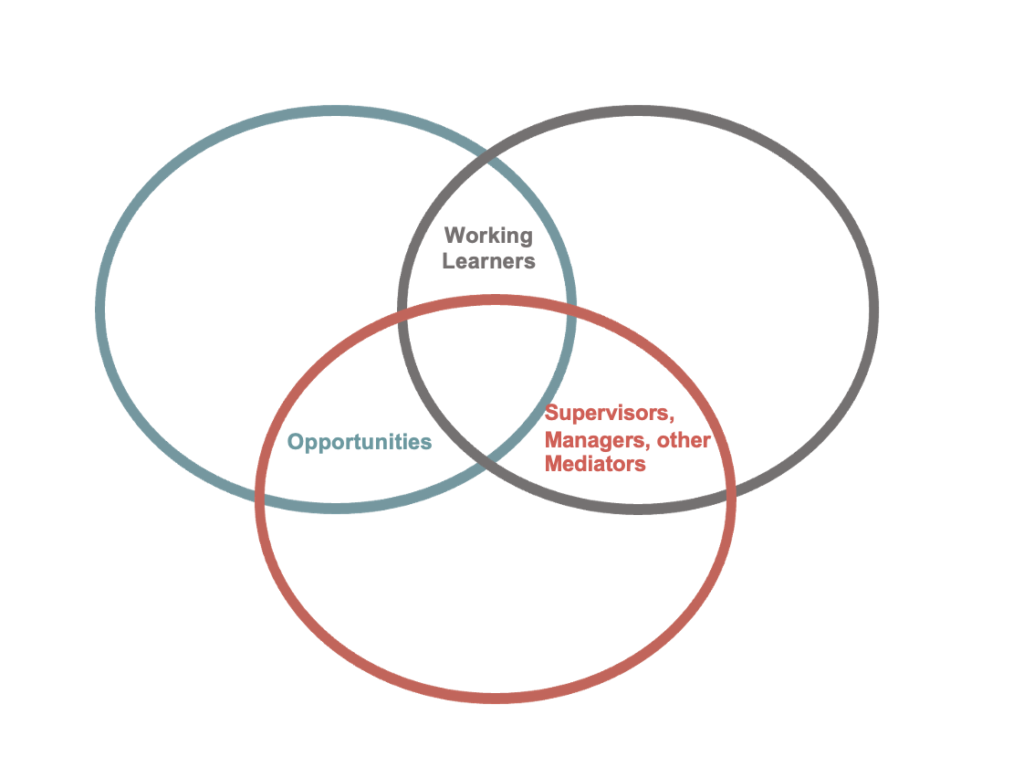Considering Who has Opportunities for Training and Advancement
December 8th, 2021 | Blogs
A goal of the 21st Century Learning Ecosystem Opportunities (21CLEO) research is to understand characteristics of employer-supported learning that may lead to advancement. In our work to date, we have come to understand that it is not necessarily the existence of educational opportunities that matter, but instead whether or not learners are recruited to participate, supported through their engagement, and shown how their skills can be leveraged for advancement.
The different learners we interviewed had very different stories to share about whether or not they were invited to engage in learning that ultimately led to advancement. Our data has suggested that the level of engagement from direct supervisors, managers, or human resource professionals at their workplace makes a difference. These stakeholders hold positions of power and can determine whether or not the learners are identified as workers who are ‘ready for’ training and advancement. This has led us to wonder how learners signal they are “ready” or “a good fit” and how managers, supervisors, or other mediators of such opportunities notice them.
The three working learners featured in this blog post represent contrasting experiences that help us to understand the level and quality of support from such mediators as has become evident in our research, and the results on the careers of these learners. All names used are pseudonyms.
 Ijakoo: Sought-Out Opportunity Elsewhere
Ijakoo: Sought-Out Opportunity ElsewhereAdvancement History
To What End?
I like to find a problems and solve things…. If I follow my hobbies, it’s better. For my family, I have gifts. Like I said because i’m single mom, so I just want to do my own thing on my schedule.
 Muhazzin: Supportive Supervisor Facilitates Advancement
Muhazzin: Supportive Supervisor Facilitates AdvancementAdvancement History
To What End?
My supervisor, he helped me a lot….he gave me a lot of internal material to understand the work what I am assigned to….actually I submitted my project on those information what he provided me.” My supervisor said “I will help you out…I will call your name on every meeting and let you talk about different issues like just normal routine issues, so your hesitation or maybe your communication is better.
 Destiny: Different Supervisors – Different Experiences
Destiny: Different Supervisors – Different ExperiencesAdvancement History
To What End?
I feel very proud of myself … I was able to get the position and they saw something in me … and [Manager James] put enough trust in into me to know that I would be able to handle the position because it was really tough as a lot of responsibility. And with [General Manager Bob], I felt discouraged and like a burden, you know, not an asset. … a lot of strikes per se that were against me. I’m black. I’m female and I was overweight. So, I think all those things had something to do, with how [General Manager Bob] felt about me.
These three contrasting working learners’ experiences indicate that there is no simple route from training to advancement. The presence of individuals who played a mediating role appears to have an impact on whether or not an individual gets tapped for training or learning opportunities, and what those learning opportunities may lead to next. Mediators, many of whom are supervisors in our data, can shape educational participation in training, and these opportunities can serve as a bridge or a barrier to working learner advancement.
On one hand, supportive mediators might take a proactive approach to move a frontline worker along a career path. Like Muzzahin’s supervisor, who did not dismiss Muzzahin’s potential because of his language proficiency, they see ‘assets’ where others might see limitations or may just not ‘see’ a worker. On the other hand, Ikajoo was not given any credentialing or advancement opportunities and Destiny was led to feel “like a burden…a lot of strikes per se that were against me.”
We are not alone in noting that the quality of supervision is a key element of worker satisfaction and access to advancement. The Aspen Institute’s Jaime Fall, writing for Upskill America in Upskilling Done Right, touches on the importance of evaluating manager performance based on their successful “development” of employees and “reward for those who do a good job”. The first hand experiences of working learners suggests that the active role supervisors and managers play in encouraging participation in learning makes a difference. Furthermore, learners benefit when these mediators thoughtfully and holistically consider workers’ past experiences.
We offer the questions that follow, organized by factors that play into advancement, to help supervisors, educators, and other mediators of worker learning to consider as they work to maximize access to and benefit of the learning opportunities they provide.
Working Learners
1. What assets did each learner bring to the workplace that might be drawn on to assist in their advancement?
2. Who typically makes decisions about what an “asset” is in a workplace?
Opportunities
1. What access did the learner have to opportunities for advancement?
2. Who typically makes decisions about this in a workplace?
Mediators of Opportunity, Training, and Advancement
1. What opportunities for mentoring (or other supports) were provided? What sort of supports were helpful?
2. Who has access to them and who does not? Who decides who gets access? How are those decisions made and who initiates, the learners or their employer?

Ideally, the answers to these questions nudge those who create education, training, and advancement opportunities to the intersection of these three factors.
World Education fosters enduring partnerships across regions and sectors to advance education outcomes for all. We offer education systems strengthening, program design and implementation, applied research and evaluation, capacity development, and policy development services.